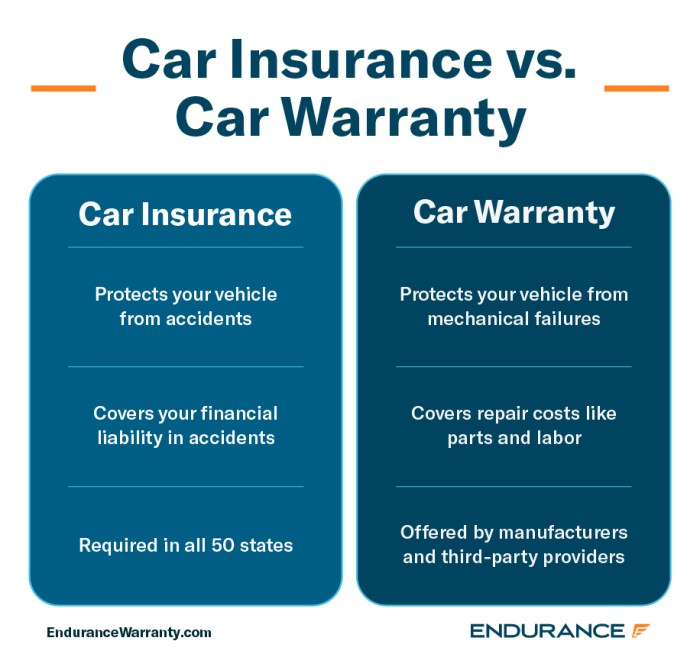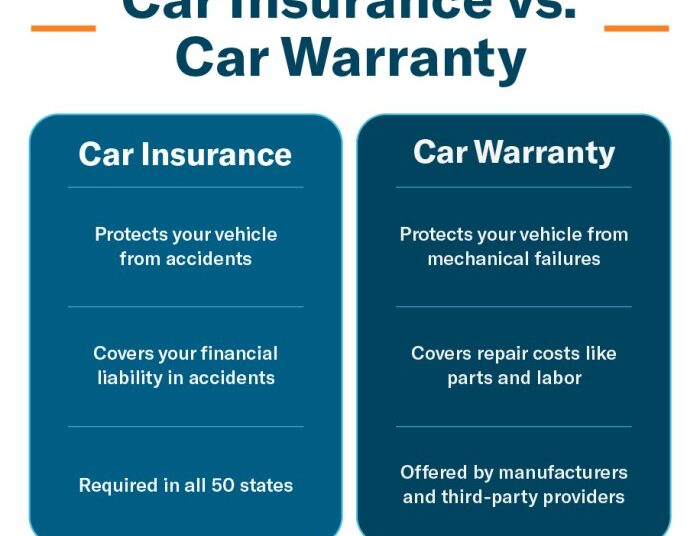Endurance Car Warranty vs Manufacturer Warranty: Key Differences sets the stage for this enthralling narrative, offering readers a glimpse into a story that is rich in detail and brimming with originality from the outset.
The comparison between an Endurance Car Warranty and a Manufacturer Warranty sheds light on crucial distinctions that can impact car owners' decisions.
Endurance Car Warranty vs Manufacturer Warranty Overview
An Endurance Car Warranty is a type of extended auto warranty that provides coverage for repairs and maintenance beyond what is offered by the manufacturer's warranty. This type of warranty is often purchased separately and can offer additional protection for your vehicle.On the other hand, a Manufacturer Warranty is a warranty provided by the car manufacturer that covers certain repairs and maintenance for a specific period of time or mileage.
This warranty is typically included with the purchase of a new vehicle and is designed to give customers peace of mind regarding the quality of the car.
Key Differences
- Endurance Car Warranty is purchased separately, while Manufacturer Warranty is included with the purchase of a new vehicle.
- Endurance Car Warranty offers extended coverage beyond the manufacturer's warranty, while Manufacturer Warranty has a set duration and coverage limits.
- Endurance Car Warranty may have more flexible coverage options and additional benefits compared to Manufacturer Warranty.
- Endurance Car Warranty is often transferable to a new owner, while Manufacturer Warranty may not be transferable.
Coverage Variations
When comparing Endurance Car Warranty vs Manufacturer Warranty, it's essential to understand the differences in coverage offered by these two types of warranties. Let's take a closer look at the specific components covered and any limitations or exclusions that may vary between the two.
Components Covered under Endurance Car Warranty
- Engine: Includes all internal components such as pistons, crankshaft, and camshaft.
- Transmission: Covers parts like the torque converter, gears, and clutch.
- Electrical System: Provides coverage for the alternator, starter motor, and wiring harness.
- Suspension: Includes components like struts, control arms, and shocks.
- Air Conditioning: Covers the compressor, condenser, and evaporator.
Comparison of Coverage under Manufacturer Warranty
- Engine and Transmission: Typically covered under the manufacturer warranty for a specific period or mileage limit.
- Electronics: Coverage for components like the infotainment system, sensors, and control modules.
- Exhaust System: Parts such as the catalytic converter and muffler may be covered by the manufacturer.
- Interior Features: Warranty may include coverage for features like power seats, navigation systems, and audio systems.
Limitations and Exclusions
- Endurance Car Warranty: Some wear and tear items may not be covered, and pre-existing conditions are typically excluded.
- Manufacturer Warranty: Limited coverage for maintenance items like brake pads, windshield wipers, and tires.
- Both warranties may have specific conditions that need to be met for coverage to apply, such as regular maintenance and timely repairs.
Duration and Renewal Options
When it comes to car warranties, understanding the duration and renewal options is crucial for making informed decisions. Let's delve into the typical duration of an Endurance Car Warranty, how Manufacturer Warranties vary in terms of length, and the renewal options available for both types of warranties.
Duration of Endurance Car Warranty
An Endurance Car Warranty typically lasts beyond the manufacturer's warranty, offering coverage for up to 8 years or 150,000 miles, depending on the plan chosen
Manufacturer Warranties Variations
Manufacturer Warranties, on the other hand, vary in length depending on the automaker and the specific model of the vehicle. They usually range from 3 to 5 years or a certain mileage limit, whichever comes first. Some high-end manufacturers may offer longer warranties as a selling point for their vehicles.
Renewal Options for Both Warranties
Endurance Car Warranties usually offer the option to renew the coverage once the initial period expires, allowing drivers to extend their protection further. Renewal options may come with additional costs but can be beneficial for those planning to keep their vehicle for an extended period.Manufacturer Warranties, on the other hand, do not typically offer renewal options as they are provided by the automaker for a specific period.
However, some manufacturers may offer extended warranty plans for purchase, providing similar coverage to an Endurance Car Warranty.
Cost Differences

When considering an extended car warranty, one of the key factors to analyze is the cost associated with it. Understanding the cost differences between an Endurance Car Warranty and a Manufacturer Warranty can help you make an informed decision.
Upfront Costs and Potential Savings
- Endurance Car Warranty: Endurance offers a variety of coverage plans with different upfront costs depending on the level of coverage you choose. While the upfront cost may be higher compared to a Manufacturer Warranty, an Endurance warranty can potentially save you money in the long run by covering expensive repairs.
- Manufacturer Warranty: Manufacturer warranties typically come with the purchase of a new car and do not require an additional upfront cost. However, the coverage may be limited and may not cover all the components of your vehicle. This could result in out-of-pocket expenses for repairs not covered by the warranty.
Additional Fees or Hidden Costs
- Endurance Car Warranty: Endurance may have additional fees such as a deductible for each repair visit, which can vary depending on the plan you choose. It's essential to understand these costs upfront to avoid any surprises when making a claim.
- Manufacturer Warranty: Manufacturer warranties usually do not have hidden costs, but they may have limitations on coverage, exclusions, or specific conditions that need to be met for repairs to be covered. Understanding these terms and conditions is crucial to avoid unexpected expenses.
Closure
In conclusion, understanding the differences between Endurance Car Warranty and Manufacturer Warranty is essential for making informed choices about protecting your vehicle. This exploration has revealed key insights that can guide you in selecting the most suitable warranty for your needs.
FAQ
What is the typical duration of an Endurance Car Warranty?
Endurance Car Warranties can vary in length, but they often provide coverage for a certain number of years or mileage. It's important to check the specific terms of the warranty for accurate information.
Are there any limitations or exclusions that may differ between an Endurance Car Warranty and a Manufacturer Warranty?
Yes, limitations and exclusions can differ between the two types of warranties. Endurance Car Warranties may have specific exclusions that are not present in Manufacturer Warranties, so it's crucial to review the terms carefully.
What are the renewal options available for both types of warranties?
Renewal options for Endurance Car Warranties and Manufacturer Warranties can vary. Some warranties may offer the possibility of extending coverage for an additional cost, while others may require purchasing a new warranty altogether. It's advisable to inquire with the warranty provider for detailed information.






![Costco Auto Insurance Review [2025]: Additional Discounts for Members ...](https://auto.goodnewsfromindonesia.id/wp-content/uploads/2025/09/costco-car-insurance-reviews-75x75.jpg)



